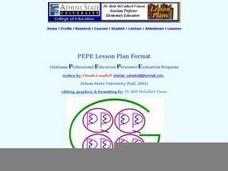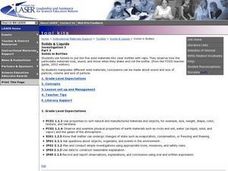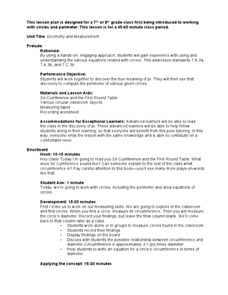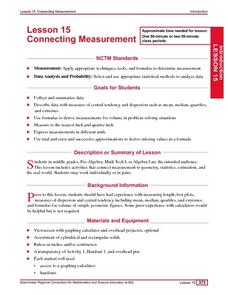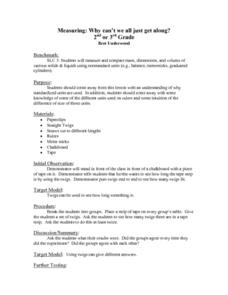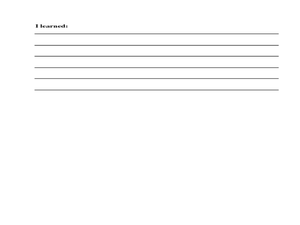Curated OER
Density Derby
Students explore the relationship between mass, volume and density. They use model boats to discover how changing mass and volume affect density. This is a very engaging lesson which provides great demonstrations and hands-on activities.
Curated OER
Who Wants to Carry a Million?
Young scholars, in groups, determine the volume of a box large enough to hold a million dollars. They calculate the dimensions of a bill and the volume of the money.
Curated OER
It Matters
Students use descriptive vocabulary to discuss the attributes of matter. Then, they sort objects or pictures by the type of matter they are comprised of. Finally, students match objects of matter with similar attributes and create a...
Teach Engineering
Floaters and Sinkers
Whatever floats your boat. Young engineers learn about density by measuring the masses and volumes of boxes filled with different materials. Using their knowledge of densities, they hypothesize whether objects with given densities will...
Nuffield Foundation
Effect of Size on Uptake by Diffusion
Cell size is limited by the surface area to volume ratio, but why is this true? Scholars measure the surface area and volume of cubes before placing them into liquid. After a set amount of time, they measure the uptake by diffusion for...
Pennsylvania Department of Education
Determine Volume of Solids Using Water Displacement
Students explore math functions by completing math equation worksheets. In this inequality lesson, students define a list of math terms and discuss the difference between an equation and inequality. Students utilize a real life situation...
Curated OER
Capacity and Volume
Second graders estimate capacities, compare pints and quarts, and identify pints and quarts.
Curated OER
DENSITIES OF REGULARLY SHAPED SOLIDS
Students calculate the volumes of regularly shaped objects from measurements of their dimensions. They use several formulas and measure different objects to calculate the density, volume, and mass of the objects selected or assigned.
Curated OER
Solids in Bottles
Students use funnels to put the five solid materials into clear bottles with caps. They observe how the particulate materials look, sound, and move when they shake and roll the bottle. Finally, students write "sound and touch" poetry.
Curated OER
Water Alchemy
After reading "Aquatic Alchemy," an article about recapturing water for reuse when in space, your class will use calcium hydroxide or hydrated lime to purify cloudy water. Geared toward high school chemistry or environmental science...
Curated OER
A Cone and Its Net
Create and investigate nets for solid shapes with your class. They identify the different parts and faces of each polygon and solid then calculate the surface area and volume of cones. They use circle sectors of varying sizes to build...
Curated OER
Measure-mania
Students research the history of measurement in this lesson. They compare todays units of measurement to historical units of measurement. For example, they weigh themselves on a bathroom scale and figure out how many of them it would...
Curated OER
Measuring and Predicting Capacity
Young scholars investigate geometric shapes through volume and dimensions. In this geometry instructional activity, students measure, weigh, and calculate sizes and volume based on estimation and calculation. They review important...
Curated OER
Density Lab Activities
Young scholars participate in several density lab activities in order to clarify the misconceptions that solids sink and liquids float. Students work with triple beam balances to find mass of objects to calculate density.
Utah Education Network (UEN)
Candies R Us
A box is fun to make, especially when it's a candy box! These activities help to cement understanding of the difference between surface area and volume. Have individuals measure the surface area of their box in two-dimensions before...
Curated OER
Geometry and Measurement
Students view a right triangle displayed by the teacher. Students measure legs and the interior angles of the triangle. They look for a pattern or relationship between the legs and angles. Students use pegboards and string to create more...
Curated OER
Measuring the Earth
Young scholars identify types of arcs and angles in a circle, find the measure of arcs and angles, and solve real world problems involving lengths of segments in circles, lengths, and areas.
Curated OER
Connecting Measurement
Students participate in activities the connect measurement to geometry, statistics, estimation, and the real world. They collect measurements from their elbow to the tip of their middle finger and make a box plot of the data as well as...
Curated OER
Volumw Measurement, English System
Eighth graders biew each volume container and discuss where they have seen them in their home, and how they have seen them used. They explore the different names of volume sizes and their equivalents towards one another. Students...
Curated OER
Measuring: Why Can't We All Just Get Along?
Students examine why having standardized units of measurement is important. They investigate the use of non-standard measure, twigs, while measuring the piece of tape. Next, they experiment with straws, paper clips, and rulers before...
Curated OER
Density and Mass
Students experiment to find which liquids are more dense. In this density and mass instructional activity, students predict and then test objects to observe and measure their density. students observe which items sink and float....
Curated OER
Measuring Water Vapor: The Microwave Water Radiometer (MWR)
Students investigate water vapor. They view and analyze photos, conduct Internet research, and analyze the total water vapor/total liquid water data plot.
Curated OER
Geometry and Shapes
High schoolers discuss and identify polygons and lines. In this geometry lesson plan, learners review liner, square and cubic units so they can incorporate it into the lesson plan on measurement and creating packing that are cost effective.
Pennsylvania Department of Education
Volume of Regular and Irregular Objects
Fifth graders examine patterns and relate to equations to solve math problems. In this patterns activity, 5th graders diagram, graph, use models and use tables to solve equations for real world problems.






